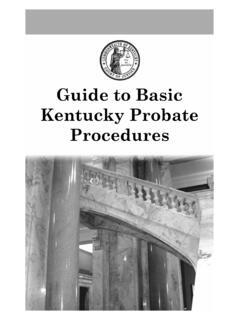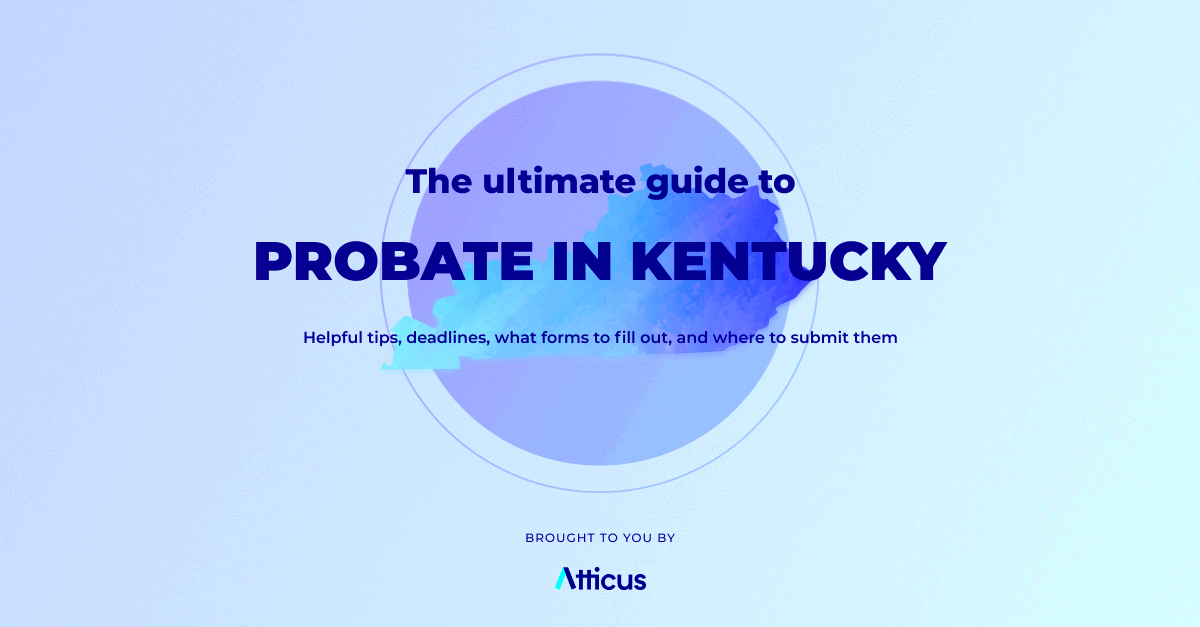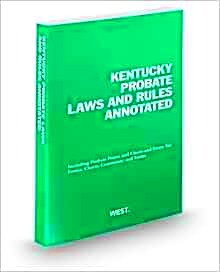Understanding Kentucky Probate Law
Kentucky probate law controls the management and distribution of a deceased person’s estate. It aims at settling debts and distributing assets as per the decedent’s intent or state law. Thus, it is vital to comprehend this legal framework especially when handling a deceased person’s estate since it can be complicated and filled with emotions. The following blog will take you through the important aspects of Kentucky probate law so that you can make your way successfully in this journey.
What is Probate and Its Purpose

When a person dies, a legal procedure known as probate takes place and comprises various significant functions:
- Validating the Will: If the deceased left a will, the probate court will determine its validity.
- Identifying Assets: The estate’s assets must be identified and appraised.
- Paying Debts: Any debts or taxes owed by the deceased must be settled before assets can be distributed.
- Distributing Assets: After debts are settled, the remaining assets are distributed to beneficiaries as per the will or state law.
In order to ensure that what the deceased wanted is done, also safeguarding the interests of those who lent money to him/her as well as the inheritors, probate becomes necessary. Furthermore, it lays down a visible way in which estates can be handled, thereby reducing conflicts between family members and other stakeholders.
The Probate Process in Kentucky

Generally, the probate process in Kentucky goes through these steps:
- Filing the Will: The executor or personal representative files the will with the local probate court.
- Notifying Beneficiaries: All beneficiaries named in the will must be notified about the probate proceedings.
- Inventorying the Estate: An inventory of the deceased’s assets is compiled, which may include real estate, bank accounts, and personal property.
- Paying Debts and Taxes: The estate must settle any outstanding debts and taxes, which may involve selling assets.
- Distribution of Assets: Once debts are settled, assets are distributed according to the will or state law.
- Closing the Estate: The executor files a final report with the court, concluding the probate process.
The complexity of the estate and whether there are disputes among beneficiaries can cause variations in the process. A knowledgeable attorney can help navigate these complexities and ensure compliance with Kentucky laws.
Types of Probate Proceedings in Kentucky

The state of Kentucky broadly identifies two types of probate cases: testate and intestate. These types dictate how to handle the deceased’ estate hence their understanding is important.
- Testate Probate: This occurs when the deceased left a valid will. The probate process will follow the instructions laid out in the will, ensuring that the assets are distributed according to the deceased’s wishes.
- Intestate Probate: This is the process followed when someone dies without a will. In this case, Kentucky state law dictates how the assets will be divided among the heirs. Typically, assets are distributed to the surviving spouse, children, and other relatives based on a predetermined hierarchy.
Also, in the two categories, there may be variations depending on the estate’s complexity:
- Formal Probate: Involves court hearings and is required for larger estates or when disputes arise.
- Summary Administration: A simplified process for smaller estates that meet certain criteria, allowing for quicker resolution.
Probate proceedings should be chosen wisely so that they can go through easily. Seeking advice from an attorney who is well-versed in this aspect will enable you to know what to do in order to suit your individual circumstances.
Common Issues in Kentucky Probate
Probate can pose several problems to those involved due to which it is often seen as a tough process. Some of these common issues include:
- Disputes Over the Will: Family members may contest the validity of the will, leading to lengthy court battles.
- Debts and Taxes: If the estate has significant debts, it can complicate the distribution of assets. Executors must ensure that all liabilities are settled first.
- Missing Assets: Some assets may not be documented, leading to confusion and potential losses.
- Mismanagement by Executors: Executors have a fiduciary duty to act in the best interest of the estate. Mismanagement can lead to legal consequences.
To solve these problems, it is essential to deliver accurate information and sometimes involve the court. Experienced probate attorneys can ease these bumps in the road.
Role of Executors and Administrators in Probate
Within the probate procedure, the executors and administratos are essential figures who work to ensure that the wishes of the deceased are realized in an efficient and lawful manner.
- Executor: This person is named in the will and is responsible for managing the estate. Their duties include:
- Filing the will with the court
- Notifying beneficiaries
- Gathering and appraising assets
- Paying debts and taxes
- Distributing assets according to the will
- Closing the estate
- Administrator: If there is no will, the court appoints an administrator to perform similar functions. Their responsibilities include:
- Identifying heirs
- Managing estate assets
- Settling debts and taxes
- Distributing assets as per state law
Both positions need to have an extensive knowledge of laws associated with inheritance and monetary obligations. Executors and administrators should carry out their functions in an unbiased manner, exercise care because they owe the estate and its heirs. This type of work can be tiresome; therefore, hiring an attorney could serve as a great source of assistance in making sure that all paperwork is completed correctly.
Understanding Wills and Trusts in Kentucky
In estate planning, wills and trusts are important tools, which can aid in making informed choices regarding properties when you know the differences. In Kentucky, the will is a legal document that specifies how one wants their things split up after death. On the other hand, while living and even dead, your property could be put under control of a trust which is more adaptable to the management of inheritance.
- Wills:
- Wills are subject to probate, meaning they must go through the legal process after your death.
- They specify beneficiaries and can include instructions for guardianship if minor children are involved.
- Wills can be contested in court, especially if there are doubts about the testator’s capacity or undue influence.
- Trusts:
- Trusts avoid probate, allowing for quicker distribution of assets.
- They can be revocable (you can change them) or irrevocable (they cannot be altered once established).
- Trusts can provide tax benefits and greater control over how assets are used after your death.
It is your unique circumstances that determines whether you choose a will or a trust. Knowledgeable about these two options, an Estate Planning Attorney can help in determining one that may be more appropriate for you and your loved ones.
Appeals and Disputes in Probate Cases
Probate disagreements can occur, resulting in appeals and complexities related to estate settlement. Some of the reasons for conflicts and solutions for managing appeals are outlined below:
- Will Contests: Family members may challenge the validity of the will, arguing issues like improper execution or lack of capacity.
- Disagreements Among Heirs: Conflicts may arise over asset distribution, especially if the will is unclear or if there are claims to certain assets.
- Executor Misconduct: If the executor is not fulfilling their duties or mismanaging the estate, beneficiaries may seek court intervention.
Probate court mediates during disputes. However, if the parties are still unsatisfied, they can appeal the decisions of the court. The appeal process typically entails:
- Filing a notice of appeal within a specified timeframe.
- Submitting briefs outlining the arguments for the appeal.
- A court hearing where both parties can present their cases.
A favorable outcome can be significantly boosted by having an attorney savvy in probate disputes.
Frequently Asked Questions about Kentucky Probate Law
So, in order to clarify some of the common issues, here are some frequently asked questions on Kentucky Probate Law as it is complicated and difficult to understand:
- How long does probate take in Kentucky?The duration varies, but the process generally takes 6 months to a year, depending on the complexity of the estate.
- What are the costs associated with probate?Probate costs can include court fees, attorney fees, and expenses related to settling the estate, which can add up to several thousand dollars.
- Can I avoid probate?Yes, using tools like trusts or joint ownership can help avoid probate. However, this requires careful planning.
- What happens if there’s no will?When someone dies intestate (without a will), Kentucky laws determine how the estate is divided among the heirs.
For more particular inquiries or exceptional circumstances, seeking a probate attorney can offer tailored direction and elucidation.
Conclusion on Kentucky Probate Law
It is important to understand Kentucky’s probate laws if you are handling the estate of someone who has passed away. The probate process may be characterized by numerous legal requirements, timeframes and possible disputes; hence sometimes, it becomes difficult for individuals on how to go about them especially when they do not have any prior knowledge about it. A lot can be done to make your life easier by just knowing about different kinds of proceedings involved, individual roles for executors or administrators, alongside making effective use of wills/trusts among other mechanisms. Furthermore, being aware of common problems and their solutions will prepare you for any barriers that come along the way. To draw your loved one’s wishes into practice without unnecessary delays and ensure fairness in settling his/her estate always seek help from an experienced probate lawyer since he/she knows every aspect related to this area.

